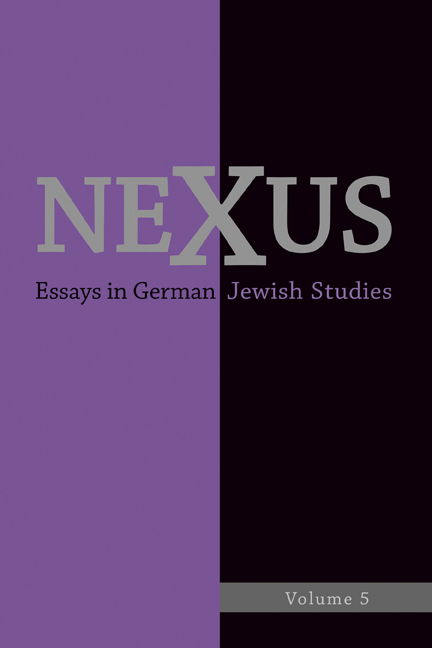 Nexus: Essays in German Jewish Studies, Volume 5
Nexus: Essays in German Jewish Studies, Volume 5 Book contents
- Frontmatter
- Dedication
- Contents
- Miscellaneous Frontmatter
- Introduction: Moments of Enlightenment for Jews and Other Germans
- Remembering Jonathan
- Jonathan M. Hess: Curriculum Vitae
- Maurice Sendak’s Dear Mili: A Contrapuntal Elegy
- Pluralism and the Modernized Jesus in Mendelssohn, Schiller, and Schleiermacher
- The Papal Game: Telling a Jewish Story from the Mayse bukh, Ayzik Meyer Dik and Marcus Lehmann
- The Fuzziness of Jewish and Non-Jewish Boundaries in Viennese Popular Culture around 1900: A Trend Toward “Similarity”?
- Freeing the Shtetl from the Ghetto Prism: Sholem Asch and Dovid Bergelson in German Translation
- A Poetics of Genocide: The Jewish Dead Confront the Germans in Katzenelson’s Warsaw Ghetto Poem “Vey dir”
- Appendix: “Vey dir”
- The New Ostjude and the Enlightened Ostdeutschen: Jewish Theater in the German Democratic Republic
- German Jewish lengevitch: A Plurilingual Poetics of Meddling
The Fuzziness of Jewish and Non-Jewish Boundaries in Viennese Popular Culture around 1900: A Trend Toward “Similarity”?
Published online by Cambridge University Press: 24 March 2021
- Frontmatter
- Dedication
- Contents
- Miscellaneous Frontmatter
- Introduction: Moments of Enlightenment for Jews and Other Germans
- Remembering Jonathan
- Jonathan M. Hess: Curriculum Vitae
- Maurice Sendak’s Dear Mili: A Contrapuntal Elegy
- Pluralism and the Modernized Jesus in Mendelssohn, Schiller, and Schleiermacher
- The Papal Game: Telling a Jewish Story from the Mayse bukh, Ayzik Meyer Dik and Marcus Lehmann
- The Fuzziness of Jewish and Non-Jewish Boundaries in Viennese Popular Culture around 1900: A Trend Toward “Similarity”?
- Freeing the Shtetl from the Ghetto Prism: Sholem Asch and Dovid Bergelson in German Translation
- A Poetics of Genocide: The Jewish Dead Confront the Germans in Katzenelson’s Warsaw Ghetto Poem “Vey dir”
- Appendix: “Vey dir”
- The New Ostjude and the Enlightened Ostdeutschen: Jewish Theater in the German Democratic Republic
- German Jewish lengevitch: A Plurilingual Poetics of Meddling
Summary
OVER THE LAST FEW YEARS, a number of Jewish Studies scholars have turned to the question of popular culture in central Europe. Their research findings contend that Jews and non-Jews interacted closely with each other. According to the historical picture scholars paint, Jews were an inseparable part of the local cultural milieu and therefore did not assimilate or acculturate, and non-Jews helped to shape the understanding of Jewishness and vice versa. Popular culture thus makes it impossible to evaluate the relations between Jews and non-Jews from a binary perspective.
Among the outstanding publications in this field is Jonathan Hess's work on Deborah, a melodramatic folk play written by Salomon Hermann Mosenthal (1821–77). Deborah became a blockbuster in the theatrical world of the nineteenth century. It received such acclaim that it was even staged at the Viennese Burgtheater and translated into fifteen languages. Deborah portrays the romantic relationship between a Jewish woman and a non-Jewish man in a small village in the Austrian countryside. Societal conventions, however, prevent the interreligious intimacy from being publicly accepted, and they finally cause its disruption. Deborah's overwhelming success was largely due to the stunning performances of actresses who played the female protagonist. They possessed the skills necessary for eliciting empathy from the audience regarding the Jewish woman's fate. One of the most intriguing aspects of this constellation of protagonist and the emotions evoked in audiences was that most of these actresses did not come from a Jewish background. Ironically, it was non-Jewish women who provided the public with an understanding of the calamities Jews suffered in non-Jewish surroundings.4 The convergence in performances of Deborah of Jewish and non-Jewish factors thus rendered Jews sympathetic to non-Jews, or at least to a considerable portion of the non-Jewish audience.
In what follows, I wish to present the outcome of a study on Viennese popular culture around 1900, with particular emphasis on the Volkssänger. The Volkssänger were performing musicians said to convey the mentality and spirit of the Habsburg capital through their songs (Wienerlieder [Viennese songs]) and performances. The Volkssanger played on makeshift stages in coffeehouses, restaurants, inns, beer gardens, and wine taverns.
- Type
- Chapter
- Information
- Nexus: Essays in German Jewish Studies, Volume 5Moments of Enlightenment: In Memory of Jonathan M. Hess, pp. 101 - 114Publisher: Boydell & BrewerPrint publication year: 2021


